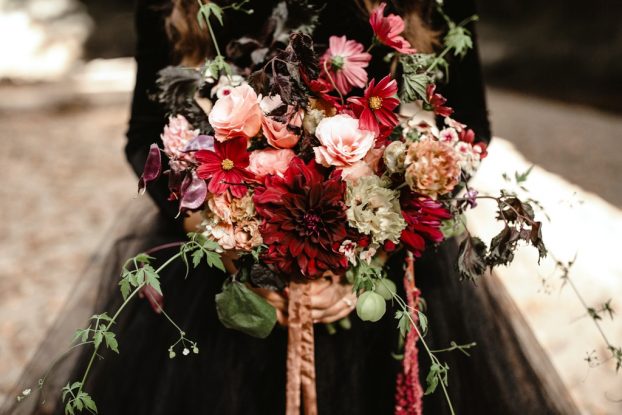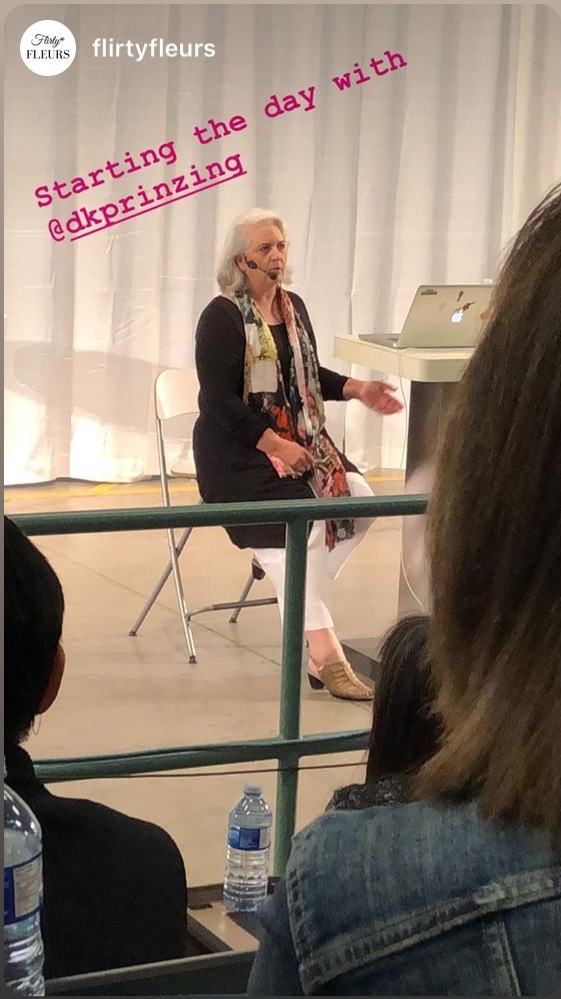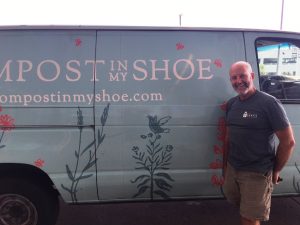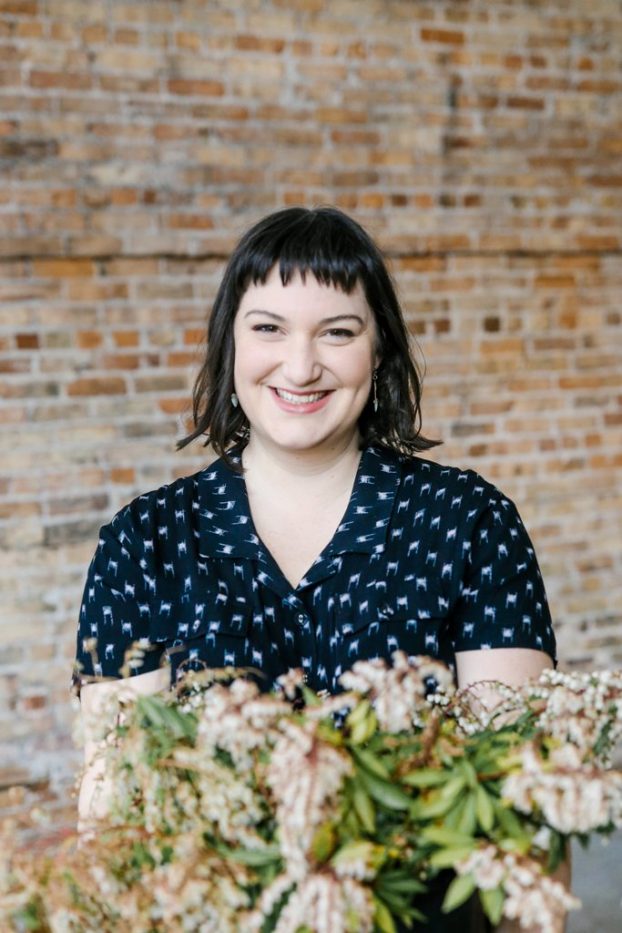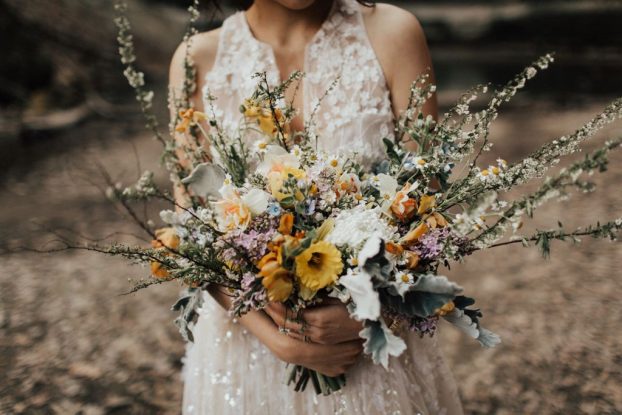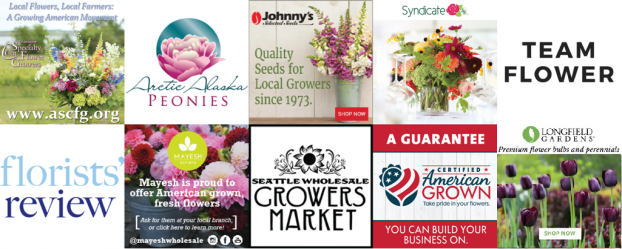Podcast: Play in new window | Download
Subscribe: Apple Podcasts | Podcast Index | RSS | More
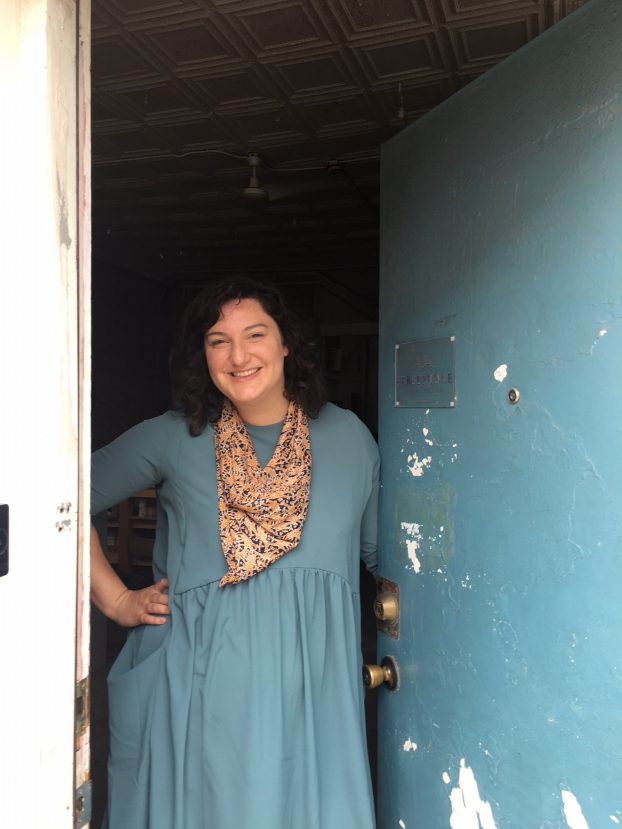
On the day I visited Mary Simmons, she greeted me at her Chicago studio, adorably matching her teal front door!
Before I introduce you to today’s guest, Mary Simmons of Persephone Floral Atelier in Chicago, I want to give a huge shout out and thanks to two floral communities who recently invited me to share the Slow Flowers Floral Insights and Industry Forecast with their audiences.
Two weeks ago, Hitomi Gilliam brought me to Vancouver, B.C., Canada, for the 2018 Floral Trend Summit, a marvelous and inventive experience encompassing five days of creativity and reimagination.
The Trend Summit occurs every two years and is nothing short of a powerful gathering of leaders,
educators and thinkers from all facets of floral.
I joined the speaker lineup with design innovator Holly Heider Chapple of Hope Flower Farm, Chapel Designers and the new Holly X Syndicate collection; Pantone color trends maven Leatrice Eiseman; and global floral design icon Gregor Lersch, as well as Hitomi Gilliam and Florists’ Review publisher Travis Rigby.
The Trend Summit included a two-day conference where participants shared ideas and dreamed of new themes for floral design in a roundtable forum, a one-day symposium open to a larger floral community of growers, retailers, wholesalers, manufacturers and designers, and a two-day design intensive led by Gregor Lersch.
Everything took place at United Floral, the all-thing-floral (including educational programs) hub outside Vancouver, hosted by the incredibly gracious and generous Tony Graaf, who also emceed some of the proceedings.
The sessions were incredible and I’m sad I missed the first few days due to other commitments. A number of reports and new initiatives will emerge from this mind-blowing series of events and I’ll keep you posted on those in the coming months.
We’ll have to bring Hitomi and Holly back together — they’re both past guests of this podcast — to share about the many inclusive and expansive things they’re cooking up for our community.
I’m grateful that Slow Flowers is invited to have a seat at that table. To me, that is a significant indication of the strides we have made in the past five years since this concept took root and became my passion — the idea that progressive and mindful flower farmers and floral designers can collaborate for a better and more sustainable profession for humans and the environment alike.
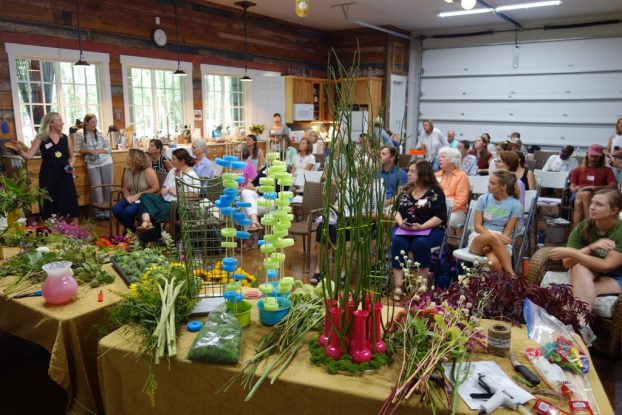
August 26 & 27 took me to Charleston, S.C., where I was hosted at the Southern Flower Symposium by Lowcountry Flower Growers, which is emerging as an important force for reclaiming and revitalizing floral agriculture in the South.
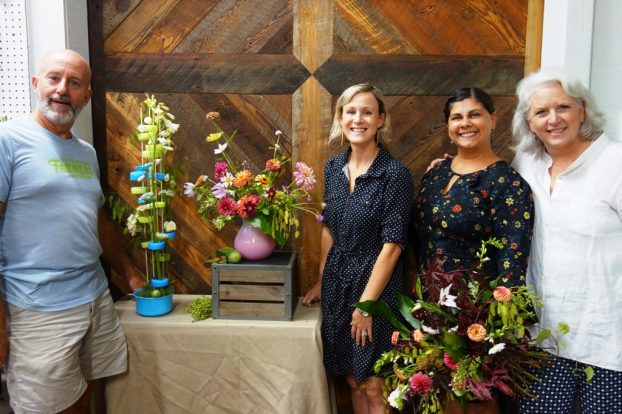
From left: Compost in my Shoe’s Jim Martin, Purple Magnolia’s Ann Cunniffe, Roadside Blooms’ Teri Reale and me
A few days after the whirlwind trip to Vancouver, which is only about 150 miles north of Seattle, I jumped on an airplane and flew cross-country to Charleston, S.C. — yes, there is a nonstop flight if you can believe it!
I was hosted by the relatively young group called Lowcountry Flower Growers, which is emerging as an important force for reclaiming and revitalizing floral agriculture in the South.
In fact, their Southern Flower Symposium, held on August 27th at Full Circle Farm on John’s Island outside Charleston, was a powerful statement of their resolve!
Thank you to the organizing team, especially my dear friend Jim Martin of Compost in My Shoe, and Laura Mewbourn of Feast & Flora Farm, along with their core group of local growers for setting up such a great, one-day symposium.
Rita Anders of Cuts of Color in Weimar, Texas, an established flower grower and past guest of this podcast, led off the day with a fabulous, zone-specific presentation on growing premium flowers in the humid, hot southern climate.
I was thrilled to again share my Insights and Forecast as well as to moderate a floral design demonstration focused on appealing to millennial customers. You can visit today’s show notes to see photos of the designs, all created with flowers donated from attending farms, and arranged in USA-made vessels donated from Syndicate Sales, not only a sponsor of this podcast, but a company with some key personnel living and working in Charleston. So this event was particularly important to them.
Now, let’s meet Mary Simmons. Mary is a trained artist and oil painter who has increasingly turned toward the three-dimensional world of floral art.
She started her business in 2016 but as you’ll hear, she has been involved in floristry much longer than that.
And from the beginning of opening Persephone Floral Atelier, the Slow Flowers philosophy has shaped her brand. Her web site continues the introduction, and here is an excerpt:
Mary strives to make each floral design a work of art. Influenced by her background in oil painting, she painstakingly composes arrangements that balance texture, color, line, and shape, while reflecting nature’s wild, untamed asymmetry.
Since opening Persephone on 2016, Mary has created floral designs for weddings and events around the country. Her favorite part about designing flowers for weddings is seeing it all come together on the wedding day.
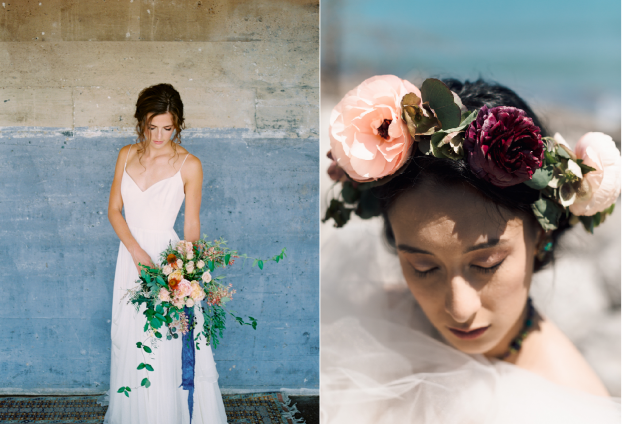 Beyond composting and using eco-friendly methods, Persephone is committed to sourcing flowers from local farmers. Mary also looks to the landscape around her, foraging from her own small garden and waysides. In the months outside the Chicago area’s local growing season, the studio relies on wholesale sources, always asking for American grown flowers first.
Beyond composting and using eco-friendly methods, Persephone is committed to sourcing flowers from local farmers. Mary also looks to the landscape around her, foraging from her own small garden and waysides. In the months outside the Chicago area’s local growing season, the studio relies on wholesale sources, always asking for American grown flowers first.
The same is true when working at a destination. It takes special skill to source local flowers when you’re not a local, but Mary has a growing network of farmers around the country and world.
Here’s how to follow and find Mary Simmons of Persephone Floral Atelier:
Persephone Floral on Instagram
Persephone Floral on Pinterest
Thanks so much for joining me today! It’s the start of the month – where did August go anyway?! Read all the news that’s blooming for you here – I’ve just sent out the September Slow Flowers newsletter.
The big news in this month’s issue is that we’ve just released videos of the speaker presentations from the 2018 Slow Flowers Summit in Washington, D.C. I heard from several of you who couldn’t attend but who asked if the presentations would be available by video!
The answer is YES. Click here to take advantage of the special offer to download Christina Stembel’s keynote presentation — “Scaling Your Floral Business to the Next Level,” as well as the full-session videos of all the Slow Flowers Summit speaker presentations.
The price is an affordable $48 for all five sessions — a full day of floral ideas, inspiration, innovation, and more — easily enjoyed at your desk or on your mobile device. Check it out!
 I am so grateful to you — and to our entire community of flower farmers and floral designers who together define the Slow Flowers Movement. As our cause gains more supporters and more passionate participants who believe in the importance of the American cut flower industry, the momentum is contagious.
I am so grateful to you — and to our entire community of flower farmers and floral designers who together define the Slow Flowers Movement. As our cause gains more supporters and more passionate participants who believe in the importance of the American cut flower industry, the momentum is contagious.
I know you feel it, too. I value your support and invite you to show your thanks and with a donation to support my ongoing advocacy, education and outreach activities. You can find the donate button in the column to the right.
The Slow Flowers Podcast has been downloaded more than 355,000 times by listeners like you. Thank you for listening, commenting and sharing – it means so much.
Thank you to our sponsors who have supported Slow Flowers and all our programs.
Florists’ Review magazine. I’m delighted to serve as Contributing Editor for Slow Flowers Journal, found in the pages of Florists’ Review. It’s the leading trade magazine in the floral industry and the only independent periodical for the retail, wholesale and supplier market.
Arctic Alaska Peonies, a cooperative of passionate family farms in the heart of Alaska providing bigger, better peony flowers during the months of July and August. Visit them today at arcticalaskapeonies.com
Seattle Wholesale Growers Market, a farmer-owned cooperative committed to providing the very best the Pacific Northwest has to offer in cut flowers, foliage and plants. The Growers Market’s mission is to foster a vibrant marketplace that sustains local flower farms and provides top-quality products and service to the local floral industry. Find them at seattlewholesalegrowersmarket.com
Longfield Gardens provides home gardeners with high quality flower bulbs and perennials. Their online store offers plants for every region and every season, from tulips and daffodils to dahlias, caladiums and amaryllis. Visit them at longfield-gardens.com.
Syndicate Sales, an American manufacturer of vases and accessories for the professional florist. Look for the American Flag Icon to find Syndicate’s USA-made products and join the Syndicate Stars loyalty program at syndicatesales.com.
Johnny’s Selected Seeds, an employee-owned company that provides our industry the best flower, herb and vegetable seeds — supplied to farms large and small and even backyard cutting gardens like mine. Check them out at johnnysseeds.com.
Association of Specialty Cut Flower Growers. Formed in 1988, ASCFG was created to educate, unite, and support commercial cut flower growers. It mission is to help growers produce high-quality floral material, and to foster and promote the local availability of that product. Learn more at ascfg.org
Mayesh Wholesale Florist. Family-owned since 1978, Mayesh is the premier wedding and event supplier in the U.S. and we’re thrilled to partner with Mayesh to promote local and domestic flowers, which they source from farms large and small around the U.S. Learn more at mayesh.com.
Certified American Grown Flowers. The Certified American-Grown program and label provide a guarantee for designers and consumers on the source of their flowers. Take pride in your flowers and buy with confidence, ask for Certified American Grown Flowers. To learn more visit americangrownflowers.org.
And the Team Flower Conference – a professional floral event where flower lovers from all over the world gather for networking, learning, and celebration. It’s a special time for the floral industry to come together and whether you’re a farmer, designer, wholesaler, or just love flowers, you’re invited to attend as Team Flowers dreams big for the industry’s future. Head to teamflower.org/slowflowers to learn more about the 2019 conference in Waco, Texas!
I’m Debra Prinzing, host and producer of the Slow Flowers Podcast.
Next week, you’re invited to join me in putting more American grown flowers on the table, one vase at a time. And If you like what you hear, please consider logging onto iTunes and posting a listener review.
The content and opinions expressed here are either mine alone or those of my guests alone, independent of any podcast sponsor or other person, company or organization.
The Slow Flowers Podcast is engineered and edited by Andrew Brenlan. Learn more about his work at soundbodymovement.com.









